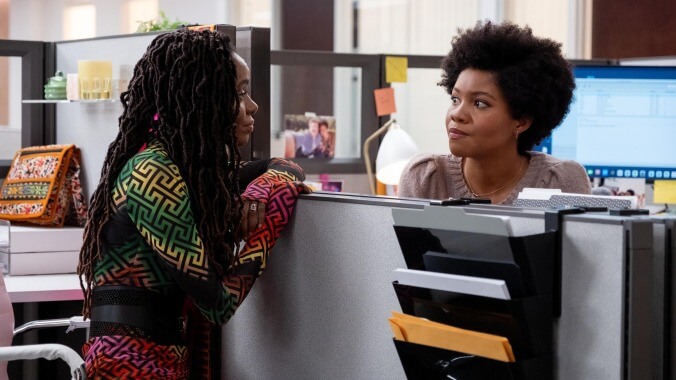The Other Black Girl review: Hulu's thriller finds far more horror in reality than the supernatural
Corporate misogynoir, cultish behavior, and cocoa-butter routines coalesce in this new series

As the tune goes, one is the loneliest number, and for Nella Rogers (Sinclair Daniel) that’s certainly true. The twentysomething editorial assistant at the center of The Other Black Girl—Hulu’s 10-episode adaptation of the 2021 bestselling novel by Zakiya Dalila Harris, which premieres September 13—has long been the sole Black woman working at Wagner Books, a high-profile publishing house in New York City. Heck, after her cubicle mate Yang exits the company, Nella is the only person of color at all at Wagner, and she’s desperate for someone—anyone—to commiserate with over the daily marginalizations and microaggressions she has to maneuver on her way to the watercooler. (One coworker, Sophie, routinely emails her “well-meaning” articles about allyship. Oof.)
She gets her wish with the arrival of the new hire, Hazel-May McCall (Riverdale’s Ashleigh Murray), our titular other Black girl. “The new Yang is Black! It’s like Wagner realized that we’re in 2023 and there can no longer only be one of us,” Nella excitedly tells her best friend Malaika (a scene-stealing Brittany Adebumola), and her eagerness is understandable. The women quickly bond over their love of Lil Baby and Burning Heart, the Diana Gordon book that Wagner published back in the ’80s when it was under the leadership of its first and only Black female editor, Kendra Rae Phillips. Nella takes comfort in the easy shorthand that comes from connecting with one of your own: the side eyes and quiet sighs and pointed “Girl…” debriefings she’s able to share with Hazel when her white, privileged boss Vera (Bellamy Young) swipes another one of her good ideas or has her go on yet another latte run or questions her valid concerns over racially insensitive book characters named Shartricia.
But unlike Nella and the rest of the Wagner office, Malaika—the show’s resident source of reason and a good quip—isn’t dazzled by the new girl: “I know that you’re starved for melanin in your life, Nella, but this is not it.” And her instincts prove correct. Right around the time that Hazel comes into her life with lipstick recommendations and much-welcome support during editorial meetings, Nella starts finding ominous notes in her coat pockets warning her to “LEAVE. WAGNER. NOW.” Add to that unsettling visions, creepy voices, and the unsolved mystery of exactly what happened to Kendra Rae all those years ago, and it’s clear that not only is there something sinister going on at the publisher, but also that Hazel isn’t exactly who she says she is.
This is the part where The Other Black Girl jumps genres from social satire to psychological thriller, pulling fellow characters like Wagner’s publishing magnate Richard (Eric McCormack), Nella’s white boyfriend Owen (Hunter Parrish), and author Diana Gordon herself (played by Garcelle Beauvais in a pulpy bit of casting) into the freaky fold. The problem is that the most spine-chilling, stomach-turning bits of the story aren’t found in the murky, magical realism that haunts Nella and Hazel in the present-day, as it did Kendra Rae and Diana decades prior, but in the clear systemic racism, internalized misogynoir, and tense tokenism that women like Nella are frighteningly forced to navigate. Flickering lights and bumps in the night can’t hold a candle to that.
It’s almost like there are two shows happening concurrently, The Other Black Girl and The Other, Other Black Girl, and both would fare better as a spin-off. Given Harris’ own background as a Black woman in publishing (the author, who is a co-writer and executive producer on the Hulu series and spent three years as an assistant editor at Penguin Random House before writing the novel), the workplace satire is far richer than the spooky stuff, and there’s real horror in witnessing Black ambition struggle within white-collar systems. It also doesn’t help that the big Jordan Peele-esque twist is, as on the page, outright absurd, though showrunners Jordan Reddout and Gus Hickey make the smart decision to introduce the horror elements much earlier than the book does.
The cast, however, is captivating and charming enough to smooth over even the most jarring of genre stumbles. Daniel, in particular, nails her character’s self-proclaimed “nerdy little Black girl who didn’t grow up with kids who looked like her” loneliness, as well as the despair when that long-awaited solidarity is replaced with suspicion and jealousy. Her rapport with Murray’s Hazel is tinged with unease, which gives even seemingly innocent conversations about haircare a foreboding edge, a tension amplified when compared to the natural, sisterly chemistry she shares with Adebumola’s Malaika.
There is much to be entertained by in The Other Black Girl and, considering how the season ends, more twists and turns are clearly planned for the future. Harris wrote only one novel following Nella, Hazel, and the insidious inner workings of Wagner Books, but given how many big ideas the series crams into its first season—racial politics, patriarchal toxicity, the weaponization of Black hair—Hulu might do well to take a page from the publisher: Why can’t there be more than one?
The Other Black Girl premieres September 13 on Hulu